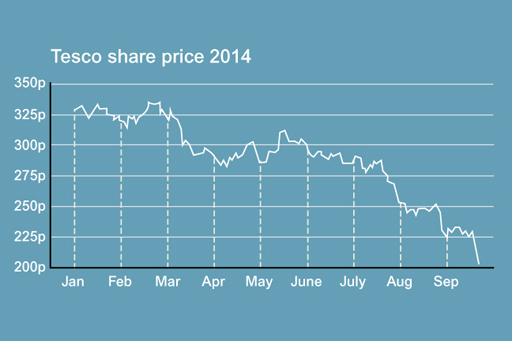1.4.2 Drivers of share prices: company specific performance
While the factors mentioned in the previous section provide the general drivers of share prices, the price of an individual share will also be driven by specific factors applying to the company in question.
Commonly, this means that the performance of an individual share outperforms or underperforms the average for the market as a whole. Sometimes this divergence can be so stark that the share price rises when the market as a whole is falling and vice versa. This differential performance is normally sourced in how the direction of company profits and dividend levels contrasts – favourably or unfavourably – with investors’ expectations and with averages for the market.
A classic recent episode in September 2014 came with the performance of the share price of the supermarket, Tesco. This plummeted after it was revealed that the company had been overstating its profits guidance to the markets, prompting a myriad of investigations, including one by the financial services regulator the Financial Conduct Authority (due to Tesco’s banking activities).
Within days Tesco’s share price was down by 30% from its 250p level at the start of the month, despite the fact that in September 2014 the overall level of the FTSE 100 was quite steady, falling by only 3%. Even the renowned investor Warren Buffet took a huge hit, given his 3.7% stake in Tesco, and within weeks he was offloading a proportion of his failed investment. Given the belief that Tesco will be forced to react by aggressive competition in the marketplace, the shares of other UK supermarket groups, like Sainsbury’s, also fell in the wake of the decline in Tesco’s share price – albeit not to the same degree.
Subsequent months saw Tesco announce a record annual loss for the financial year ending in February 2015 of £6.4 billion and a major overhaul of its senior management. Tesco’s share price fell to a low of just under 156p in early 2015, although by 1 May 2015 it had recovered to 225p.
Tesco was a classic case of the crystallisation of specific risk relating to the investment in a specific company as opposed to the market as a whole.

